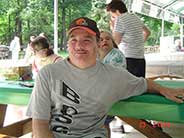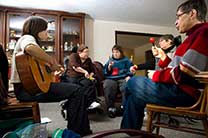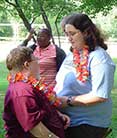Once you and your child have found potential housemates, it’s important for everyone to get to know each other better before making any final decisions. You should be actively involved in this process, because you may be able to assess true compatibility better than your child.
Ideas for getting to know each other better are as follows.
- Share Letters of Intent or Life Plans with the Other Parents.
- These documents may contain important information that parents did not think to mention in meetings and conversations.
- Alternatively, relevant excerpts, such as daily routines, could be shared instead of the whole document.
- This may be particularly helpful if your child finds it difficult to interact with many potential housemates, because you can read about potential housemates ahead of time.
- Potential Housemates Should Spend Time Together.
- Initially, social activities in a relatively stress-free setting will be most comfortable.
- As they spend more time together, create opportunities for the group to work or make decisions together. For example, everyone could prepare a meal, including choosing the menu, shopping for supplies, cooking, and cleaning up.
- The amount of time they should spend together depends on the group. Friends will not need to spend as much time as those who have just met. Plan additional activities when there is any uncertainty.
- Have “Practice Runs”
- Trial overnight visits are most effective when the routine is similar to what will take place on a regular basis in the home. For example, families may rent a cabin, so that the children can share a bathroom or clean up together.
- A neutral location gives a clearer picture because one person will not have “home turf” advantage. However, if one family will own the house and rent to the others, it might be preferable to have the trial visits in that family’s home.
- Have a Support Provider Spend Time with the Group.
- A third party can make an objective assessment of how the potential housemates interact.
- It may be possible to use existing respite funds to contract with a provider for this service.
- If a provider has already been chosen, the families could work with that provider. Some have hired a social worker to spend time with their children prior to the move and during the transition to address compatibility concerns.
- Listen to Your Child’s Concerns
- After they get to know each other, find out what your child thinks and feels. He or she may point something out that a you didn’t realize was causing discomfort.
- Families Should Share Worries with Each Other.
- Plan how to assess the compatibility of all housemates with the families.
- Tactfully share how you feel about the other children and listen to what is said about your own.
- Dealing honestly with difficult issues will go a long way toward avoiding conflict, frustration, and hurt feelings later.
Family Compatibility
Working together to build a home is really about consciously creating a community.The compatibility of the families working together is almost as important as that of the individuals living together. Several parents describe it as being “like a marriage, except a lot more people are involved.”
Parents who have been through the process report several factors that are key successfully finding compatible families:
- A Common Vision for the Children
- This is the most important compatibility factor.
- Beyond the goal of finding a home, parents must also envision how they will be involved in their child’s life over time.
- No two visions are exactly alike, similarities and differences in this area can give the best clues to potential compatibility. Be willing to share your vision with others.
- Positive Group Dynamics
- Families need to talk about conflicts openly and honestly.
- Don’t avoid difficult topics. Postponing discussions only worsens the eventual conflict.
- Remember, small issues during the planning process turn into big issues once the children are living together.
- Understanding Individual Family Dynamics
- Parenting styles differ within each family. It is important to understand these dynamics.
- In a family-directed home, you will be involved in the life of another parent’s child. Work together to build a home that is really about consciously creating a community.
- Knowing What’s Not Crucial to Compatibility
- Age, economic level, religion, and cultural background are often not key indicators of compatibility.
- While similarities do not hurt, some of the most successful families have significant differences in these areas.
Questions to Ask Families of Potential Housemates
Remember, the most important key to compatibility is that the families share a vision for all of the children, not just their own.The overall goal of these questions is to determine if the families are concerned only for their own child or if they also want to develop a nurturing community for each child.
- What is your child’s vision for his or her future?
- What is your vision for your child’s future? (Discuss this question in the context of the individual, as well as the extended family and community.)
- What are the primary life themes that you strive to help your child establish? (They might include independence, community involvement, and personal responsibility.)
- How does working together fit with your overall goals for your child?
- What kind of a home do you want for your child?
- What kind of home does your child want?
- How do you want to be involved in the operation of the home and in the life of your child?
- What are your expectations about the level of involvement that each parent/family will have in the lives of the other housemates?
- In a perfect world, what would the future look like for your child?













